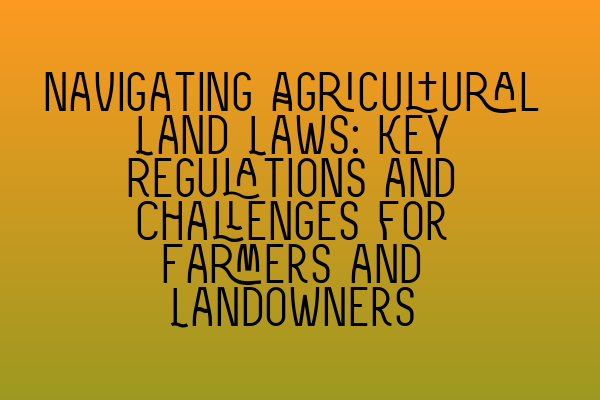Navigating Agricultural Land Laws: Key Regulations and Challenges for Farmers and Landowners
Introduction
The agricultural industry plays a crucial role in society, providing us with food, fuel, and other essential resources. However, this sector faces its fair share of legal complexities and challenges. Understanding the key regulations and laws that apply to agricultural land is crucial for farmers and landowners to navigate successfully. In this blog post, we will explore some of the most important regulations and challenges in agricultural land law, helping you stay informed and compliant with the legal framework.
1. Agricultural Holdings Act 1986
The Agricultural Holdings Act 1986 (AHA) is one of the fundamental pieces of legislation that govern agricultural tenancies in England and Wales. It sets out the rights and obligations of both landlords and tenants, providing a framework for the relationship between the two parties. Understanding the provisions of the AHA is crucial for farmers and landowners involved in tenancies to ensure compliance and protect their interests.
2. The Basic Payment Scheme
The Basic Payment Scheme (BPS) is an EU subsidy scheme aimed at supporting farmers and landowners in providing valuable environmental stewardship and maintaining agricultural land. As the UK undergoes Brexit, the future of the BPS remains uncertain. Farmers and landowners must stay up to date with the latest developments and understand how changes to the BPS may impact their operations.
3. Environmental Stewardship Schemes
Environmental stewardship schemes, such as the Countryside Stewardship Scheme (CSS), provide financial incentives to farmers and landowners for implementing environmentally friendly practices on their land. These schemes aim to promote biodiversity, protect natural resources, and enhance the rural landscape. Participating in such schemes can have significant benefits for farmers and landowners, both environmentally and economically.
4. Planning and Development Control
Farmers and landowners often encounter planning and development control issues when considering diversification projects or expanding their agricultural operations. Local planning authorities have regulations and guidelines in place that guide the development of agricultural land. Understanding the planning permission requirements and engaging with the relevant authorities is crucial to avoid potential legal issues.
5. Rights of Way and Access Rights
Rights of way and access rights can pose challenges for farmers and landowners who need to balance their own interests with public access requirements. The law grants certain rights of way to the public, which can sometimes interfere with agricultural activities. Understanding the rights and obligations regarding public access is important to manage potential conflicts and protect agricultural land.
6. Agricultural Contracts and Agreements
Agreements and contracts are essential components of agricultural transactions. Whether it’s a tenancy agreement, a supply contract, or a land sale agreement, farmers and landowners must ensure that these contracts are properly drafted and legally binding. Seeking professional legal advice can help avoid pitfalls and ensure that the terms of the agreement align with your best interests.
7. Water Rights and Environmental Regulations
Water rights and environmental regulations are crucial considerations for farmers and landowners, particularly those operating near water bodies or engaging in activities that impact the environment. Compliance with regulations related to water usage, pollution prevention, and waste management is essential to avoid fines and legal consequences.
Conclusion
Navigating agricultural land laws can be a complex and daunting task for farmers and landowners. Understanding the key regulations and challenges discussed in this blog post is essential for ensuring compliance, protecting interests, and avoiding potential legal issues. By staying informed and seeking professional legal advice when needed, farmers and landowners can effectively manage their agricultural operations within the legal framework.
Remember to explore other resources, such as SQE 1 practice exam questions, SQE 1 practice mocks FLK1 FLK2, SQE 2 preparation courses, SQE 1 preparation courses, and SRA SQE exam dates, to enhance your knowledge and stay updated on the latest legal developments.
Stay informed, stay compliant, and successfully navigate agricultural land laws to achieve long-term success in your farming and land management endeavors.
